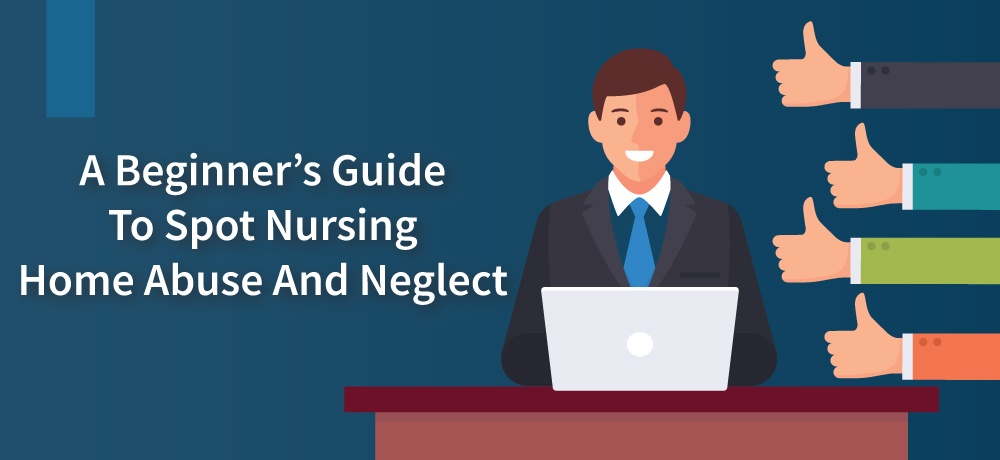
To prevent your loved one from becoming a victim of nursing home abuse and neglect, you need to understand the warning signs. Visiting your family member regularly is not enough to prevent their abuse and neglect. This is because too often concerns are ignored or brushed aside because while you sense something isn’t right, you trust that the nursing home is employing competent professionals.
Sadly, this isn’t always the case. Also, even if the caregivers are qualified and responsible, a nursing home may be understaffed to the point that the caregivers are set up to fail.
If you are armed with the knowledge you need to spot abuse and neglect, you will feel comfortable and confident enough to intervene. To help you take the necessary action, Churchill Huston Law, LLC has compiled a Beginner’s Guide to spot nursing home abuse and neglect. The goal of this guide is to provide you with the knowledge needed to recognize the signs of nursing home abuse and neglect before your family member becomes a victim.
Getting Started
Know the warning signs: Bedsores, falls, broken bones, bruises, unexplained injuries, weight loss, lack of hygiene, dry lips, and the smell of urine or feces are all signs that your loved one could be a victim of nursing home abuse and neglect.
Know who is in charge: In case you notice the above warning signs, you have the right to file a complaint. However, we are frequently told by families that they are reluctant to complain out of fear that their loved one will suffer retribution. Unfortunately, this is a very real concern. In case you are uncomfortable complaining to the direct care staff, know that you can voice your concerns to the Director of Nursing and the Nursing Home Administrator.
Making your concerns known in writing can have a powerful impact. Also, don’t be afraid to use resources outside of the nursing home to help protect your family member. Every state has a way to lodge complaints about inadequate care in a nursing home. We often hear from clients that they believe the nursing home inspectors are too “buddy-buddy” with the people they inspect. While there is truth to this concern, the more times inspectors enter a nursing home, the better the results will be.
Next Steps
Remove your loved one from the nursing home: Removing your loved one from the nursing home is an option if you are fortunate enough to live in an area that has multiple facilities close enough for a family to visit. In this instance, the nursing home social worker is required to assist you with discharge planning. Don’t be afraid to use that resource.
For those without viable alternative nursing homes, you can explore the idea of in-home health services. However, this decision needs to be weighed carefully and made in consultation with your doctor to make sure you can meet the healthcare needs of your family member. If in-home care is not an option, it is even more important to recognize the warning signs and find out who is in charge!
Make a complaint: Irrespective of your fears of retribution or confrontations, it is essential for you to speak up for your loved one. Voicing your concerns over poor care can result in action being taken either voluntarily by the nursing home or forcefully by law.
Follow up in writing: Whether it is a letter or an email, communicating with nursing homes in writing increases the chances that your concerns will be taken seriously. In addition, a letter or email prevents your concerns from being lost in the shuffle or disregarded because your interaction with staff became confrontational.
Advice From The Pros
Keep cool: How you interact with caregivers is just as important. Remember to keep your cool and stay calm. If you don’t, it will be used as an excuse to blame you for the abuse and neglect of your loved one. Try to remember that some care providers are usually in a situation where the nursing home is understaffed, and so has been set up to fail. If a conversation feels like it is getting heated, walk away. You can always find someone in charge, like the director of nursing or the nursing home administrator.
Trust your instincts: Everyone knows that bedsores form because people are left in bed without being turned and repositioned. Everyone knows that leaving people in urine or feces is unacceptable. Everyone knows that if you don’t get enough food and water, you will be malnourished and dehydrated. Everyone knows that people who are a fall risk need to be watched. You don’t have to be a doctor or nurse to spot abuse and neglect like this.
You are not alone: The most important thing to remember is you are not alone. Contacting an attorney specializing in nursing home abuse and neglect cases can be an invaluable resource. Connect with a specialist when in doubt of nursing home abuse or neglect.
If you’re looking for a leading nursing home neglect lawyer in Philadelphia, PA, reach out to Churchill Huston Law LLC. As the go-to experts for nursing home abuse, neglect, and medical negligence cases, we make sure to exceed your expectations and put your loved ones first. Our goal is to improve the quality of nursing home services, so people like you and your loved ones don’t have to suffer additional woes.
Visit our website to learn more about what we do or contact Churchill Huston Law LLC today.
